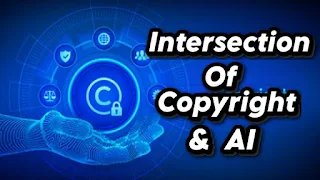A Thomson Reuters Victory and the Questions it Raises
Hey everybody, I'm so glad you're here. Today, I want to dive into a fascinating and rapidly evolving area: the intersection of AI and copyright law. News broke last week that Thomson Reuters successfully sued Ross Intelligence for copyright infringement and won. This is a monumental moment, marking a significant first in dealing with copyright issues surrounding AI-generated content.
This victory raises a plethora of questions, including: What does this mean for the future of AI development? How can we effectively control AI and its potential for copyright violations? What do existing copyright laws even say about AI-generated works? And finally, will this precedent reshape the landscape of AI and how we utilize this powerful technology?
I have to tell you, I've spent several hours poring over information on this topic, and I feel like I've barely scratched the surface. So, let's explore what I've managed to uncover so far.
The Thomson Reuters vs. Ross Intelligence case centered around the allegation that Ross Intelligence, an AI legal research platform, used copyrighted content from Thomson Reuters' Westlaw service to train its AI model. The court sided with Thomson Reuters, essentially establishing that using copyrighted material to train an AI can constitute copyright infringement.
What Does This Mean for AI?
This ruling has significant implications for the AI industry. It suggests that AI developers need to be extremely cautious about the data they use to train their models. Simply scraping data from the internet without regard for copyright is no longer a viable strategy.
This could lead to: Increased Costs: Sourcing legally compliant training data will likely become more expensive, potentially hindering the development of smaller AI startups.
Slower Development: The need to carefully vet training data could slow down the pace of AI development.
Focus on Synthetic Data: We might see a greater emphasis on synthetic data, which is artificially generated and therefore doesn't infringe on existing copyrights.
Controlling AI and Copyright Infringement: A Complex Challenge
Controlling AI in the context of copyright is incredibly complex. AI models are often black boxes, making it difficult to understand how they arrive at their conclusions or where they might be drawing inspiration from. Key questions arise:How do we monitor AI to ensure it's not infringing on copyright?
Who is liable when an AI infringes on copyright - the developer, the user, or the AI itself?
What constitutes "fair use" when it comes to training AI models on copyrighted data?
The answers to these questions are far from clear and will likely require ongoing legal and ethical debate.
Copyright Law and AI: A Gray Area
Current copyright laws are not explicitly designed to address the unique challenges posed by AI. Existing laws primarily focus on human authorship, making it difficult to apply them to AI-generated
content. Key areas of ambiguity include: Can AI be considered an author? Most jurisdictions currently require human authorship for copyright protection.
What level of human input is required for an AI-generated work to be copyrightable?
How do we balance the rights of copyright holders with the potential benefits of AI innovation?
The Future of AI: A Shift in Approach?
The Thomson Reuters victory could potentially lead to significant changes in the way AI is developed and used. We might see:Greater collaboration between AI developers and copyright holders.
The development of new licensing models for AI training data.
A push for legislative clarity on AI and copyright.
Increased investment in AI technologies that prioritize ethical and legal considerations.
Ultimately, the ongoing discussion around AI and copyright is crucial. It's a complex and multifaceted issue that requires careful consideration to ensure that copyright laws are both respected and don't stifle innovation in the exciting and transformative world of artificial intelligence. This is just the beginning of the conversation, and I'm eager to continue learning and exploring this evolving landscape together.

















